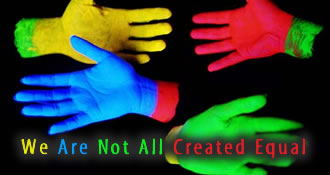
It is very disturbing to the Western mind, to the American mind in particular, to suggest that one group of people is superior to another. Perhaps this is so because in the past, the belief or the argument that one group of people is inferior to another has led to genocide. So Americans have become deeply committed to ideas of equality, and it has become a goal, a moral virtue to which American society aspires. But there is something inherently mistaken with this attitude or belief in equality as a means of attaining greater good, a greater morality.
Our ideas of equality have their origins in Thomas Jefferson's claim, that all men are created equal. Obviously, Jefferson did not mean that literally. He was not speaking of the differences between individuals that make some stronger, smarter, and better than others. He was speaking of a universal principle by virtue of which all men are equal. But our society has become so focused on achieving equality, that we insist on "equality" as a criterion and virtue in life. In doing so, we pretend to ignore the differences between people. Equality, however, is not a virtue.
We cannot demand anything on the grounds of equality, because equality remains to be seen. People are different, and necessarily so. Some are brighter, more talented and more beautiful than others. Some are better at some things and others are better at other things. And there is no morality in denying our differences. In fact, it is dangerous and immoral to predicate morality on the assumption that we are all equal, because that leaves open the possibility that, should you discover that I am in fact inferior to you, then it's all right for you to abuse me. What really is morality?
Briefly stated, the Torah says that morality means that the strong may not take advantage of the weak. Where there are no strong and no weak, if everybody is the same, there is no need for morality. It is precisely where there can be abuse, that we need morality. Which is why the Torah says that we may not be cruel to animals. No one is going to argue that animals are our equal. Certainly, the animal is inferior to human beings. The human being has many advantages over the animal which make it possible for him to outwit it, to torture it and do nearly anything he wants with it. Yet the Torah says, "You may not be cruel to animals."
To put it differently, if someone would say to me that I, as a Jew, am therefore inferior to him, my moral obligation would be to teach him that being inferior, he may not take advantage of me. I have no obligation to teach him or prove to him that I am not inferior. Rather, my moral obligation is to tell him, "Yes, you may be stronger than I am, this is your country, I'm just a stranger here, you've got the money, the power and the authority, but you may not take advantage of me." That is morality. Because it does not allow for abuse or mistreatment in spite of inequality. What we need then, is not to pursue equality, but rather to pursue a universal value - universal because it includes all people and applies to all humankind at all times.
Under such a value, individual differences become irrelevant because each individual, all other considerations notwithstanding, is bound in equal measure by the value. This universal value, Judaism teaches, is that all people were created to serve G-d. Here is where equality lies. In the value - not in the people. When we start off with a universal value that spreads equality over us all, our differences are not threatening.
When we recognize that each of us is bound by an obligation to serve G-d - that each of us was created for this purpose, then our individual qualities and differences do not make us uncomfortable. They are the means or the details through which each of us fulfills our individual purpose in the service of G-d. Just as a good life produces happiness - not the reverse - so too, does a moral life produce equality among all people. Equality, is the by-product, not the end. A society that strives to live under universal principles of morality will inevitably be one that respects the life of each individual.

